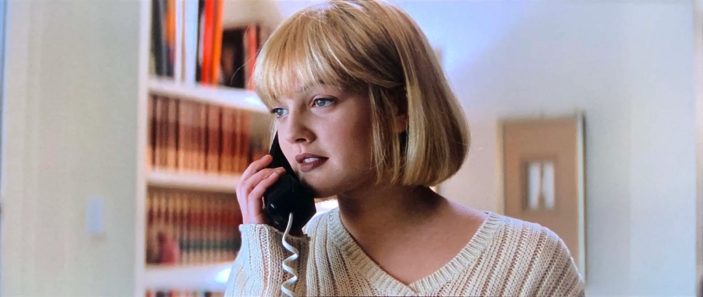
Releasing a horror movie only days out from Christmas doesn’t seem like the smartest marketing ploy. Add to that a slasher example of the genre at a time when “horror” was a bad word – and so often relegated to the straight-to-video treatment – and you had, essentially, a film slashed dead on arrival. Such was the presumed fate of Scream – Wes Craven‘s 1996 horror experiment that blended the mentality of whodunnit with satirical comedy and a knowing edge of its characters openly discussing the tropes of the genre; “They’re all the same. Some stupid killer stalking some big breasted girl who can’t act who’s always running up the stairs when she should be going out the front door. It’s insulting”, so says the film’s virginal heroine, Sidney Prescott (Neve Campbell), who decidedly doesn’t like the very genre she’s finding herself the real-life star of.
But it was in that bold strategy of counter-programming, self-referential wit, and shocking unpredictability of killing off your biggest star only 12 minutes in your running time that earned the film considerable box office staying power, critical appreciation, and, eventually, 4 sequels that (mostly) maintained Craven’s intended temperament; a fifth sequel – tentatively known as Scream VI is due out in March next year.
It goes without saying that Scream is now considered a classic of the genre. As it so openly showed love to such horror power players as Halloween (1978) A Nightmare on Elm Street (1984), and When A Stranger Calls (1979), it has so often been cited as an inspiration for many of the slashers that were released in its wake. Whilst every straight-to-video effort had a group of pretty young things offed by a masked killer of sorts, those that had serious backing and made a suitable splash across the late 90’s and early 2000’s in cinemas – from I Know What You Did Last Summer (1997) and Urban Legend (1998), to The Faculty (1998), Halloween: H20 (1998), and Valentine (2001) – utilised the blueprint of casting attractive, familiar actors who could sprout dialogue of horror awareness, and, if they were lucky, had the honour of being brutally murdered before the opening credits rolled; given this film is almost 26 years old, I don’t think it’s that much of a spoiler by saying the Drew Barrymore stalk sequence that opens Scream has gone down in horror history as both one of the greatest film openings and murder set-pieces to grace the screen, and was so desperately mimicked to no equal success.
Just why Barrymore’s blonde-bobbed 17-year-old Casey Becker is so mercilessly gutted in the opening of Scream is a mystery that kickstarts, but not drives Craven and Kevin Williamson‘s film, instead finding its centre in Campbell’s Prescott, a fellow high-schooler still reeling in the aftermath of her mother’s shock murder the year prior. What feels like a random attack – acts that oft-begin with a stirring phone call asking about scary movies and their clichés – plays into a larger narrative around a masked killer and their intent on bringing the truth of Sidney’s mother’s death to fruition; but not without offing a few innocent bystanders in the process.
Whilst in the 26 years since its release there are certain technological entities here that date it considerably – namely around the use of mobile phones – but, for and of its time, Scream‘s freshness and ultimate impact on cinema can’t be denied. Whether it was in its bold marketing strategy around hyping Barrymore as its lead at the time, placing a stronger emphasis on female characters that refused the damsel-in-distress archetype (both Courteney Cox‘s snappy reporter Gale Weathers and Rose McGowan‘s feisty best friend Tatum earning points for their strength throughout), the homosexual undertones that helped layer and forward the film’s intelligence, or for the simple fact that it’s just very funny, incredibly tense, and treats its audience with respect, Scream remains the rarity of the genre that continually benefits from its re-watchability all these years later; no matter how many times you know the outcome of certain scenes, the nuances injected through subtle performances, intuitive directing, and smart writing continually surprise and impress in a manner the slasher subsect of horror is so rarely afforded.
![]()
![]()
![]()
![]()
![]()
FIVE STARS (OUT OF FIVE)
4K SPECIAL FEATURES
For a film that’s 26 years old, any upgrading was going to benefit the film, and indeed this 4K mastering of Craven’s film is particularly stunning. To be fair, Scream has always looked pretty good, but the majority of night-time sequences here benefit from the rich black texture of a 4K rendering.
Feature-wise, the A Bloody Legacy: Scream 25 Years Later extra isn’t as expansive as one might’ve hoped, with this being more a Scream (2022) extra as it includes the original stars (Campbell, Cox and David Arquette) and the new cast members of the fifth film (including Melissa Barrera, Dylan Minnette, and Mason Gooding), as well as the latter film’s directors (Matt Bettinelli-Olpin and Tyler Gillett) discussing their love of the film and how influential Craven was. It’s sweet, and the affection for the famed, late director is there (Craven sadly passed in 2015), but for a film of such evident impact this deserved to be a much longer segment.
The Production Featurette, Behind The Scenes, and Q&A with the Cast and Crew are all very standard features, and crossovers from the original DVD and Blu-Ray releases, as is the commentary track from Craven and Williamson. It would have been nice if we had an updated discussion in some form, but to hear the two discuss the film with such love only months after its original release (Craven mentions their about to start work on Scream 2) means there’s a genuine, instant reaction to what they’re watching.
![]()
![]()
![]()
![]()
![]()
THREE AND A HALF STARS (OUT OF FIVE)
Scream is now available to purchase on 4K Ultra HD through Kicks.
